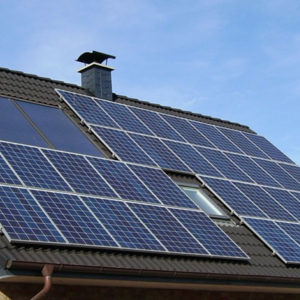You can manage your cookie preferences in the sections below. If you would like to know more, please view our privacy & cookie policy.
Why it’s time to generate your own business electricity
Wind and solar sources now generate more electricity in the UK than nuclear power, and the nation has recently seen weekday energy consumption drop by 13.5%, largely as a result of large and industrial businesses switching off during the coronavirus lockdown.
Here’s why now is the ideal time for your business to turn to its own renewable electricity.

How can businesses generate their own electricity?
Tapping into your own resources, such as wind and solar power, can offer many benefits to your business, but making the leap from simply buying your electricity from a supplier to generating your own can seem pretty daunting.
That’s why you need to approach energy generation as another arm of your business, and maybe even treat it as another department with its own budget and targets. This means considering the following:
- Stakeholder ambitions - Get input from across the business from all stakeholders before implementing any changs. This will help define how and why you’ll be generating your own power.
- Business size and location - The size of your business will dictate the amount you’ll need to spend on infrastructure, while its location will determine the source of your energy - if you’re near the coast, for instance, wind might be your best bet. Likewise, your location could restrict your options, particularly if planning permission is an obstacle.
- Overall targets - Generating your own energy has many benefits, so you’ll need to figure out which are most important to your business when putting your plans together, taking into account the following:
- Lower energy bills
- Increased revenue
- Lower carbon emissions
- Greater sustainability
- Perception of your business
You’ll then need to work out which renewable energy source best suits your business, in terms of cost, efficiency and return on investment, before choosing from the following options:
- Wind power
- Solar PV panels
- Solar thermal energy
- Biomass systems
- Anaerobic digestion.
- Geothermal and ground source heat pumps
- Combined heat and power
- Hydroelectric power
For more information on each, along with average costs and possible benefits, check out https://www.ukpower.co.uk/business_energy/renewable-energy-for-business
If you don’t have the money to fund a renewable business energy project, it’s worth looking into any grants or funding that might be available to you, as the government offers incentives for businesses looking to cut their energy consumption to help hit certain sustainability targets.
How to switch to a green business energy deal
If now isn’t the right time for your business to consider generating its own energy, you can still do your bit for the environment by switching to a green energy deal. Most energy suppliers will now offer at least 100% renewable electricity - derived from wind, solar, biomass or hydroelectric sources - and some even offer green gas. Crown Energy, for instance, offers 100%, 50% or 25% biomethane or ‘green gas’, but this is only available to large businesses, so might not be suitable if you own a SME.
To switch to a green energy deal, or to compare business energy rates to see how much money you could save on your annual gas and electricity bills, give our commercial energy experts a call now on 0800 188 4909, or enter your postcode at our business energy page, and we’ll give you a call back.
What is a green energy tariff?
If the environment is your top priority, then it could be worth signing up to a green energy deal which will see your supplier use renewable sources to provide some or all of your gas and electricity.Click here to run an energy price comparison, and see if you could be paying less for your gas and electricity.


